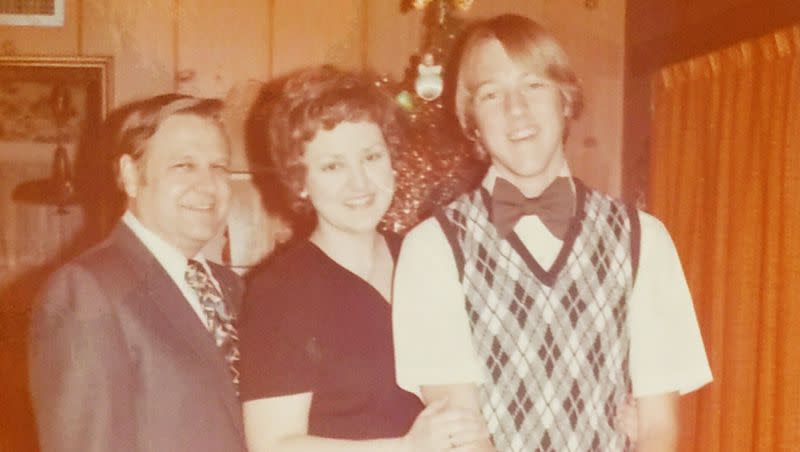Opinion: What I learned from a 50-year-old recording of a family Christmas

- Oops!Something went wrong.Please try again later.
I gave my father a Bette Midler album for Christmas.
It’s worse than it sounds. The year was 1973. This was my 47-year-old dad, a quality control engineer who was a leader of the Rotary Club, a product of the Depression and World War II, and who had raised serious concerns when I decided, earlier that year, to let my hair grow over my ears. I don’t think I had ever seen him load a record onto our family stereo console, unless my mother asked him to put on a classical or religious album.
I told him I thought it was something he would enjoy, thus demonstrating, with the type of proof that would stand up in any court, that 14-year-old boys are clueless.
I wouldn’t be rummaging through this dusty memory (which I had completely lost in a hard-to-find corner of the archives of my mind), except that I had, for reasons only a 14-year-old boy could explain, decided to make a cassette tape recording of our family opening presents that Christmas.
As I listened to it the other day, I was sure glad I had.
Nothing brings the past to mind quite like an audio recording of the actual thing. And nothing puts the world in a more proper perspective than to ponder Christmas, up close and as a silent audio observer, from a half-century ago.
When I run across old catalogs, newspapers or, in this case, recordings, I like to play a game, of sorts. I like to imagine myself traveling back to that time with the salary I have today, not accounting for inflation (what would be the fun in that?).
As it turns out, I could buy just about anything I found in a newspaper from that day, courtesy of newspapers.com. I could have been the hit of that Christmas.
On the upper end of the scale, I could get a 17-jewel Bulova watch for $90. My Dad might have liked that better. A 19-inch color television set was $268. A pocket-sized Kodak camera went for $89.47.
Or, for a mere $69.95, I could have bought my older sister a stereo, complete with an eight-track player. That Christmas recording might have been much livelier, or filled with stunned silence.
But, of course, coming from late 2023, I couldn’t give those things without understanding their true worth through the perspective of time. I might be able to live like a king, but only by 1973 standards. The definition of wealth changes quickly when you look at those things through the eyes of the future.
Even under the best of circumstances, the watch would end up scratched and, most likely, lifeless in a drawer within several years. The television would be incapable of receiving digital signals today and likely would have been junked years ago. The Kodak camera would have been set aside when digital cameras appeared, if not much sooner. And the eight-track? Try explaining that one to your grandkids.
Even the clothes I could have bought would, unfortunately, be in the style of the ’70s.
Most everything given and received by my family 50 years ago has long since lost its value, except, perhaps, to a collector or two. Few people would give it a second look in the junk bin.
Ultimately, I am left with this whenever I play the game. Worldly goods and wealth are fleeting. Real, lasting treasure is around us every day, but it has nothing to do with the things money can buy.
I think of this when I hear about the shoplifting epidemic that U.S. retailers say cost them almost $100 billion combined in 2021. For what? Shoplifters are risking a lot to acquire things that moth and rust inevitably destroy.
Christmas, whether in 1973 or today, is a time to celebrate the birth of Jesus Christ, who labored to pry minds away from temporary worldly pleasures and to instead “lay up … treasures in heaven, where neither moth nor rust doth corrupt, and where thieves do not break through nor steal.”
In contrast to shoplifters, he is the ultimate layaway angel, paying debts everyone has accumulated and none of us is capable of repaying.
By the end of the recording I made 50 years ago, I am left longing for more. Not more presents or idle banter, but more time with parents who sound so young but who have long since gone to their graves. More time to ask them all the questions I have accumulated since they left. More time to express my love and thanks. More time to apologize for giving an album that probably never left its shrink wrap.
The being whose birth we celebrate on Monday will make that possible, too, and that is worth a real celebration.

